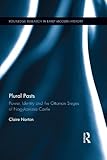Plural Pasts Power, Identity and the Ottoman Sieges of Nagykanizsa Castle
Language: English Publication details: Oxford Routledge 20170203Edition: 1Description: 202 pISBN:- 9781317079606
Through a study of a variety of Ottoman and modern Turkish accounts of the Ottoman-Habsburg sieges of Nagykanizsa Castle (1600-01) including official documents, correspondence, histories, and more literary genres such as gazavatnames [campaign narratives], Plural Pasts explores Ottoman literacy practices. By considering the diverse roles that the various accounts served – construction of identities, forging of diplomatic alliances and legitimization of political ideologies and geo-political imaginations – it explores the cultural and socio-political significance the various accounts had for different audiences. In addition, it interweaves theoretical reflection with textual analysis. Using the sieges of Nagykanizsa as a case study, it offers a sophisticated contribution to ongoing historiographical arguments: namely, how historians construct hierarchies of primary sources and judge some to be more truthful, or more valuable, than others; how texts are assigned to particular genres based on perceived epistemological status – as story or history, fact or fiction; and the circular role that historians and their histories play in constructing, reflecting and reinforcing cultural and political imaginaries.
There are no comments on this title.
